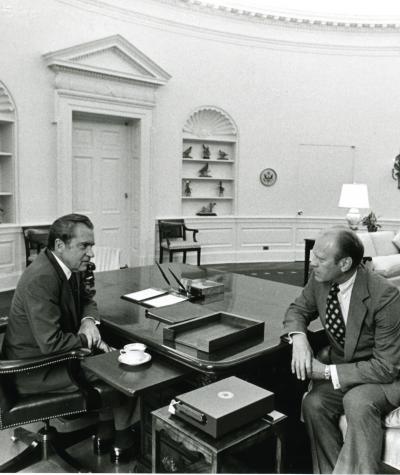When President Richard Nixon resigned 46 years ago, in the wake of the Watergate scandal that shook the nation, he spoke of “healing the wounds of this Nation.” He concluded that to heal from one of the largest political scandals the country had ever seen, orchestrated by Nixon and his administration, he must resign.
Despite his personal desires to complete his presidential term, he ultimately conceded that the “interest of the Nation must always come before any personal considerations.”
Many people will remember Nixon’s words as ending a scandal and ushering in reform. If reform follows scandal, then we should be set for a huge new wave of ethics reforms when the Trump administration ends, be it in January 2021 or four years after that. However, this over-simplified recollection of Nixon’s resignation misses that a change election is not a silver bullet.
A new administration alone won’t change the very deep-seated problems with our government ethics laws. All elected officials who assume office after the Trump presidency ends must prioritize ethics, but it will take an all-hands-on-deck approach to hold them accountable in the coming years.
Nixon was right—the interests of the public must always come before any personal interests of any individual public servant. The post-Watergate reforms reflected that notion. The Ethics in Government Act (EIGA) created the Office of Government Ethics (OGE) to oversee the executive ethics program and to prevent and resolve conflicts of interest.
It required senior government employees to shine a light on their financial interests and subject them to public scrutiny.
In the years since, the system has worked reasonably well. Both Republican and Democratic administrations have abided by EIGA’s ethics rules, as well as the ethical norms set by their predecessors.
But in the Trump administration, each day brings a fresh and innovative violation of ethics rules or norms.
After one political scandal, Watergate, and Nixon’s resignation, it took four years to pass EIGA. How long will we need to fix all the weaknesses of our ethics laws exposed by the Trump administration, and what will it take?
To start, new reforms will need to tackle everything from presidential conflicts of interest to stopping regulatory capture resulting from weak revolving door restrictions. The good news is that the democracy reform community has been working on these issues for a long time, and the public and a new Congress need not look far for ethics reforms.
H.R. 1, a comprehensive democracy reform bill, tackles many of the ethics issues with the Trump administration that have kept ethics watchdogs up at night.
One provision codifies the norm that the president and vice president act as though they are bound by the conflict of interest statute: it requires the president and vice president to divest all financial interests that pose a conflict by converting them to cash or placing them in a qualified blind or diversified trust.
H.R. 1 would also require the president to disclose certain business relationships and prohibit the use of federal funds at businesses owned by the president. The bill strengthens OGE by giving it investigative authority and allowing OGE’s director broader authority to oversee ethics waivers and recusals.
It codifies the ethics pledge, making adherence to its tenets less optional. And it reduces conflicts of interest for those entering government from powerful and wealthy industries by prohibiting so-called “golden parachute” payments.
Even the passage of H.R. 1 will not guarantee an ethical government for generations to come. In the words of John Lewis, “democracy is not a state. It is an act.” A functioning democracy requires constant vigilance from the public and each new generation doing its part to secure democracy’s future.


